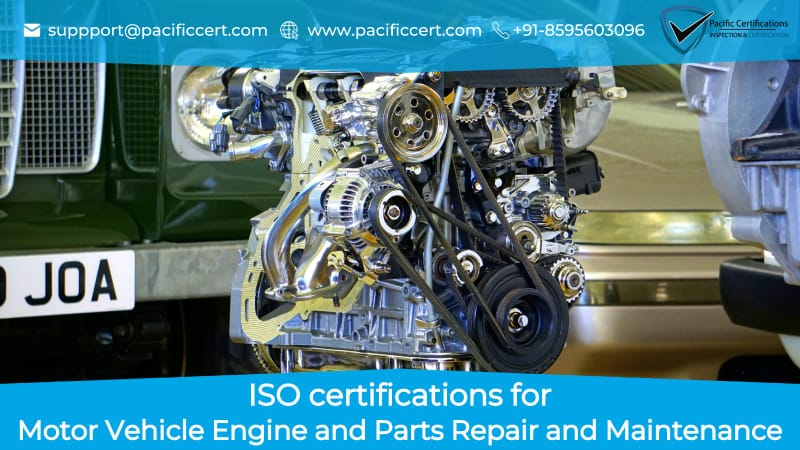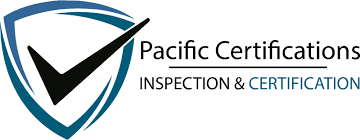ISO Certifications for Motor Vehicle Engine and Parts Repair and Maintenance

Introduction
Motor vehicle engine and parts repair and maintenance operations involve diagnostic testing, engine rebuilding, transmission overhaul, component replacement, electronic system programming, and performance restoration services across diverse vehicle types. Repair facilities face operational challenges including technical complexity of modern vehicles, exposure to hazardous chemicals, heavy equipment handling, fire risks from flammable materials, workplace injuries from lifting and repetitive tasks, and environmental compliance for waste oils and parts disposal. These businesses provide engine diagnostics and repair, parts remanufacturing and reconditioning, preventive maintenance scheduling, warranty repair services, and specialized technical support for independent operators and authorized service centers.
ISO certifications provide motor vehicle repair shops, engine rebuilders, parts remanufacturers, and maintenance service providers with internationally recognized management frameworks to ensure consistent quality, protect worker safety, manage environmental impacts, and secure customer data. Repair businesses face mounting pressure from automotive manufacturers, environmental protection agencies, occupational safety regulators, and consumer protection authorities to demonstrate systematic quality controls, hazardous waste management, workplace safety protocols, and data security measures.
Quality repairs and operational safety build lasting customer trust.
Quick Summary
ISO certifications provide motor vehicle repair and maintenance with internationally recognized frameworks to manage service quality through ISO 9001, automotive quality standards through IATF 16949, occupational health and safety through ISO 45001, environmental impacts through ISO 14001, information security through ISO/IEC 27001, risk management through ISO 31000, energy efficiency through ISO 50001, and business continuity through ISO 22301.
For more information on how we can assist your motor vehicle repair and maintenance business with ISO certifications, contact us at [email protected]
Applicable ISO Standards for Motor Vehicle Repair and Maintenance Businesses
Below are the most relevant ISO standards applicable to automotive repair shops, engine rebuilding facilities, parts remanufacturers, and authorized service centers:
IATF 16949:2016 – Automotive Quality Management Systems
IATF 16949 is critical for automotive repair and parts remanufacturing businesses serving OEM supply chains, establishing quality management requirements for defect prevention, variation reduction, waste elimination, and continuous improvement aligned with automotive industry customer-specific requirements. This standard demonstrates systematic quality controls for production parts, service components, and accessory manufacturing, enabling repair facilities to meet automotive manufacturer quality expectations and supply chain integration requirements.
ISO 9001: Quality Management Systems (QMS)
ISO 9001 ensures motor vehicle repair operations deliver consistent, high-quality services through documented procedures for diagnostics, repair processes, parts sourcing, warranty management, and customer satisfaction measurement. Implementation enables repair facilities to standardize service delivery, reduce rework, improve first-time fix rates, manage supplier quality, and enhance customer confidence through systematic quality controls.
ISO 14001:2015 - Environmental Management Systems
ISO 14001 addresses environmental impacts from automotive repair operations including hazardous waste oils, used filters and parts, solvent emissions, coolant disposal, battery handling, and wastewater from cleaning operations. Implementation ensures compliance with environmental regulations, establishes systematic waste management procedures, reduces pollution, and demonstrates environmental responsibility to regulators and customers.
ISO 45001:2018 - Occupational Health and Safety Management Systems
ISO 45001 systematically manages workplace hazards unique to automotive repair including vehicle lifting risks, chemical exposures to solvents and oils, fire hazards from flammable materials, electrical shock risks, ergonomic strain from manual handling, and rotating equipment dangers. This standard protects mechanics, technicians, and support staff through hazard identification, risk assessment, control implementation, and continuous safety performance monitoring reducing workplace injuries and regulatory violations.
ISO 27001:2022- Information Security Management Systems
ISO/IEC 27001 protects sensitive information in automotive repair operations including customer financial data, vehicle diagnostic records, proprietary manufacturer repair procedures, warranty claims, and electronic control unit programming data. This standard establishes security controls for digital diagnostic equipment, cloud-based management systems, payment processing, and customer databases protecting against cyber threats and data breaches.
ISO 31000:2018 – Risk Management
ISO 31000 provides automotive repair businesses with structured approaches to identify, assess, and mitigate operational risks including quality failures, workplace incidents, environmental violations, customer dissatisfaction, equipment breakdowns, and supply chain disruptions. This framework enables repair facilities to make informed decisions, allocate resources effectively, and ensure operational resilience in competitive service markets.
ISO 37001:2016 - Anti-Bribery Management Systems
ISO 37001 specifies requirements and provides guidance for establishing, implementing, maintaining, reviewing, and improving an anti-bribery management system. This can be particularly useful for companies that want to demonstrate their commitment to ethical business practices and compliance with anti-bribery laws.
Click here to find out more applicable standards to your industry
What are the Requirements of ISO Certifications for Motor Vehicle Repair and Maintenance Businesses?
Motor vehicle repair and maintenance providers seeking ISO certification must establish and maintain documented policies, procedures, and records aligned with the selected ISO standards. Key requirements include the following:
IATF 16949:2016 – Automotive Quality Management Systems
Establish quality management system meeting ISO 9001 requirements plus automotive-specific requirements for defect prevention and variation reduction
Implement process approach addressing automotive customer-specific requirements, product safety, and supply chain quality expectations
Define control plans for manufacturing operations, parts remanufacturing, critical processes, and supplier quality management
Ensure top management commitment to quality policy, customer focus, continual improvement, and resource allocation
Monitor customer satisfaction, warranty performance, field failures, and take corrective actions to achieve sustained quality
Maintain documented corporate responsibility policies addressing ethics, escalation processes, and employee motivation
ISO 9001:2015 – Quality Management Systems
Develop quality policy and objectives for repair consistency, customer satisfaction, and continuous service improvement
Define processes for diagnostic procedures, repair operations, parts sourcing, warranty management, and customer service delivery
Control supplier quality for replacement parts, specialty tools, diagnostic equipment, and outsourced services
Allocate resources including skilled technicians, calibrated diagnostic equipment, specialized tools, and facility infrastructure
Monitor and measure service quality through first-time fix rates, comebacks, customer feedback, and warranty claims
Conduct management reviews analyzing quality performance, customer complaints, internal audit results, and improvement opportunities
ISO 45001:2018 – Occupational Health and Safety Management Systems
Establish occupational health and safety policy addressing vehicle lifting, chemical handling, fire prevention, and ergonomic hazards
Identify workplace hazards through risk assessments of repair bays, equipment operation, chemical storage, and maintenance activities
Implement control measures including proper lifting procedures, personal protective equipment, ventilation systems, and fire suppression equipment
Ensure worker participation through safety committees, hazard reporting systems, and consultation on operational changes affecting safety
Monitor occupational health metrics including injury rates, chemical exposures, near-miss incidents, and safety training completion
Conduct regular safety inspections of repair equipment, lifting devices, chemical storage, and facility conditions
ISO 14001:2015 – Environmental Management Systems
Develop environmental policy addressing waste oil disposal, parts recycling, solvent emissions, and hazardous material management
Identify environmental aspects including waste oils, used filters, batteries, coolants, solvents, cleaning wastewater, and scrap parts
Ensure compliance with environmental permits, waste disposal regulations, air quality standards, and wastewater discharge requirements
Set environmental objectives for waste reduction, recycling programs, energy efficiency, and pollution prevention
Monitor environmental performance through waste tracking, disposal documentation, emissions monitoring, and audit results
ISO/IEC 27001:2022 – Information Security Management Systems
Establish information security policy protecting customer financial data, diagnostic records, vehicle information, and proprietary repair procedures
Identify information assets including diagnostic software, customer databases, warranty systems, payment processing, and manufacturer technical portals
Assess information security risks from cyber attacks, data breaches, unauthorized access, payment fraud, and system failures
Implement security controls for network protection, access management, data encryption, backup procedures, and incident response protocols
Tip: Initiate your ISO journey by documenting current repair procedures, safety protocols, and environmental practices already in place within your facility. Involve experienced technicians, service advisors, and parts specialists in developing practical procedures reflecting actual diagnostic workflows, repair sequences, and quality checks rather than theoretical documentation disconnected from shop floor realities.
For more information on how we can assist your motor vehicle repair and maintenance business with ISO certifications, contact us at [email protected].
What are the Benefits of ISO Certifications for Motor Vehicle Repair and Maintenance Businesses?
ISO certifications deliver substantial operational and competitive advantages for motor vehicle repair providers, establishing systematic frameworks that enhance service quality, workplace safety, environmental responsibility, and customer confidence while positioning businesses for growth in competitive automotive service markets, listed below are the key benefits for the ISO standards applicable to automotive repair shops, engine rebuilding facilities, parts remanufacturers, and authorized service centers:
Improved service quality through standardized diagnostic procedures, consistent repair processes, and reduced rework rates enhancing first-time fix performance
Stronger customer satisfaction from reliable service delivery, effective warranty management, transparent processes, and systematic complaint resolution
Enhanced workplace safety reducing mechanic injuries from lifting hazards, chemical exposures, equipment accidents, and ergonomic strain
Better environmental compliance minimizing regulatory violations, fines, and operational shutdowns from improper waste disposal or emissions
Greater competitive advantage in securing OEM authorized service contracts, fleet maintenance agreements, and warranty repair authorizations
Reduced operational risks through systematic hazard controls, business continuity planning, and information security protecting customer data
Higher operational efficiency with optimized workflows, reduced variation, waste elimination, and improved resource utilization
Lower insurance costs from demonstrated safety management, reduced incident rates, and systematic risk mitigation protocols
Improved supplier relationships through quality requirements, performance monitoring, and automotive supply chain integration
Strengthened reputation demonstrating professional commitment to quality, safety, environmental responsibility, and customer data protection
The global automotive repair and maintenance market reached USD 860 billion and is projected to exceed USD 1.15 trillion in the coming years, driven by increasing vehicle complexity, longer vehicle lifespan, growing adoption of electric and hybrid vehicles requiring specialized service, and expanding vehicle ownership in emerging markets. Regulatory authorities are implementing stricter requirements for technician certification, environmental waste management, workplace safety protocols, and data security particularly for connected vehicle diagnostics and electronic systems programming.
ISO implementation in automotive repair operations delivers 20-30% reductions in service comebacks, measurable improvements in first-time fix rates, enhanced workplace safety performance, and stronger environmental compliance reducing regulatory violations. ISO certification is becoming baseline requirement for authorized service networks, OEM supply chain participation, fleet maintenance contracts, and insurance company preferred provider programs as technological complexity drives demand for certified quality and safety management systems.
How Pacific Certifications Can Help
Pacific Certifications, accredited by ABIS, acts as an independent certification body for motor vehicle repair and maintenance businesses by conducting impartial audits against applicable ISO standards. Our role is to objectively assess whether documented management systems and automotive repair operational practices conform to international ISO requirements, based strictly on verifiable evidence and operational records.
We support motor vehicle repair and maintenance providers through:
Independent certification audits conducted in accordance with ISO/IEC 17021
Practical assessment of real repair operations, diagnostic procedures, safety controls, environmental practices, and quality systems
Clear audit reporting reflecting conformity status and certification decisions
Internationally recognized ISO certification upon successful compliance
Surveillance and recertification audits to maintain certification validity
Objective evaluation of management systems across multiple repair facilities and service locations
Contact Us
If you need more support with ISO certifications for your motor vehicle repair and maintenance business, contact us at [email protected] or +91-8595603096.
Author: Ashish
Suggested Certifications –
Read More at: Blogs by Pacific Certifications

